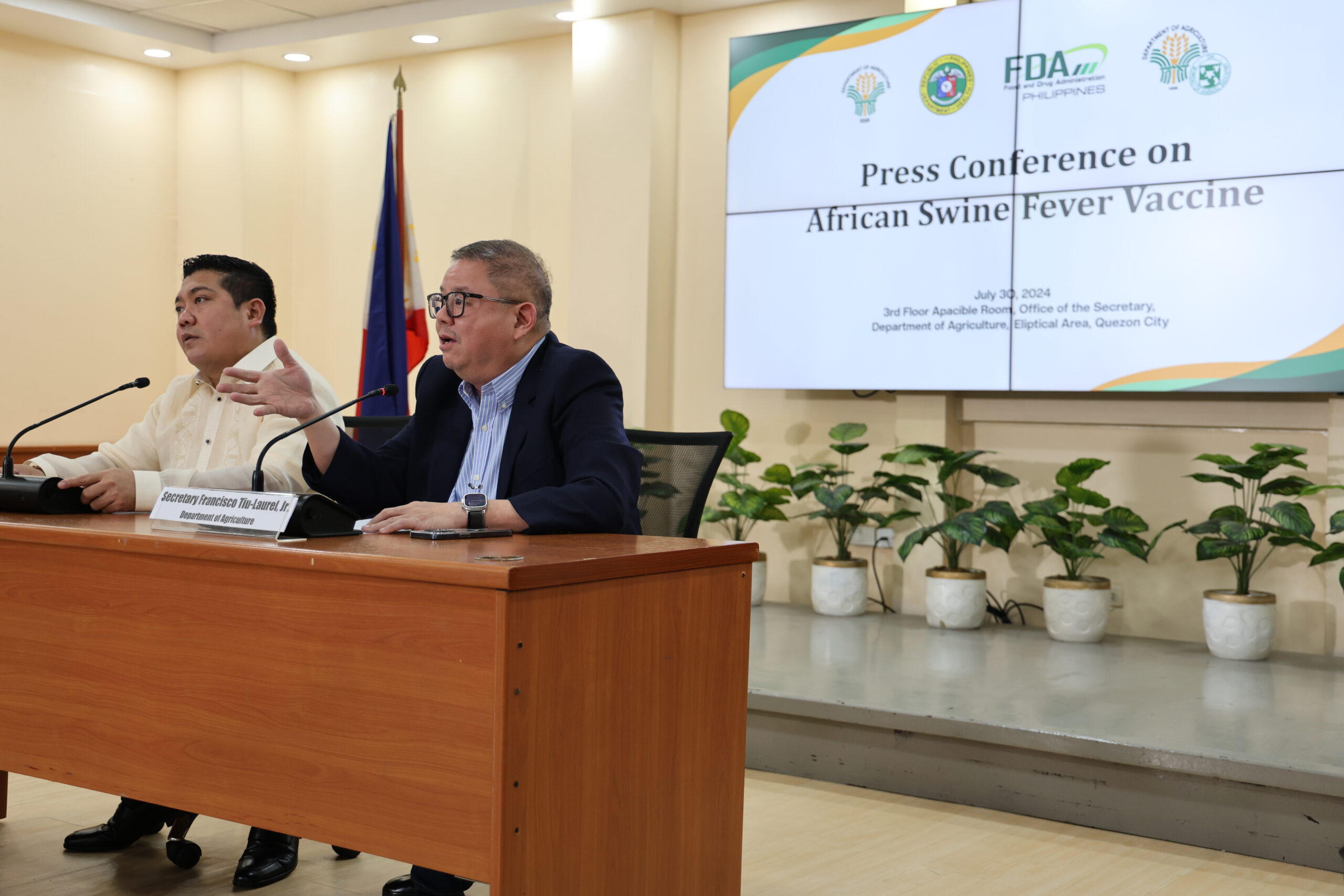
The Department of Agriculture (DA) and the Food and Drug Administration (FDA) announced the rollout of the vaccine against African Swine Fever (ASF) by the third quarter of 2024.
In a joint press conference, Agriculture Secretary Francisco Tiu Laurel, Jr. confirmed that the DA, through the Bureau of Animal Industry (BAI), is “finalizing guidelines with agricultural and veterinary stakeholders for the controlled use of ASF vaccines, with public consultations to follow.”
The rollout will be strictly voluntary and will prioritize eligible commercial farms, semi-commercial enterprises, and clustered backyard farms—most likely in the Red and Pink Zones—under strict supervision of the DA-BAI.
By virtue of the DA Administrative Circular No. 2, series of 2022, the Amended National ASF Zoning and Movement Plan defines Red Zones as municipalities or cities with confirmed ASF cases that spread to other barangays in the same municipality or city within 15 days, while Pink Zones include the Metro Manila as well as cities and municipalities where ASF is not detected but demarcated immediately around the Red Zone.
As of July 14, the National ASF Prevention and Control Program (NASFPCP) of the DA-BAI reported 403 Red Rones and 737 Pink Zones in the Philippines.
Out of the Department’s target of 600,000 doses, around 150,000 doses of A-VAC ASF Live are expected to arrive in the Philippines by the third quarter of 2024. On its official website, the AVAC ASF LIVE vaccine is developed by the AVAC Viet Nam., JSC and is described as “a freeze-dried, attenuated vaccine that is cultivated on the DMAC [Diep’s Macrophage cell] cell line.” The said vaccine is intended for pigs that are four weeks old and above with a recommended single-dose administration and a protective immunity period of at least five months.
The vaccines, as explained by FDA Director General Samuel Zacate, underwent clinical trials for two years and have been proven safe and efficacious based on the DA-BAI monitoring and FDA regulations.
“It only has a two-year Certificate of Product Registration (CPR) under monitored release with specific conditions and is subject to annual evaluation. So whatever happens, it will be referred to an independent body—a group of experts that will be determined by the DA—and their recommendation will be acknowledged by the FDA either to continue, to revoke the CPR, or to proceed with the commercialization of the vaccine,” FDA Director-General Zacate assured.
“Mayroon pa rin pong applicants [na vaccine developers] undergoing trials. It just so happened na nauna [ang A-VAC] and they have been proven with the utmost high benefit as compared to the risks involved. It must be a significant one for us to be prompted to stop the issuance of CPR with monitored release. Statistics-wise, we will follow up,” he added.
A total of P350 million was allocated by the DA to fund the purchase of vaccines, syringes, and other necessities for the ASF vaccine rollout. Secretary Tiu Laurel believes that the positive impacts of the rollout—specifically a steep decline in ASF cases as well as market prices for pork and pork products—will be felt by June 2025.
“This vaccine procurement demonstrates the DA’s commitment to safeguard the swine industry and enhance national food security amid the challenges of ASF. Rest assured that we will always remain dedicated to supporting hog farmers and ensuring the resilience and sustainability of our agriculture sector,” Secretary Tiu Laurel expressed.
FDA Director General Samuel Zacate also expressed support for the Department’s initiative to eliminate ASF in the Philippines through the vaccine rollout. He also urged the public to report to the FDA and local authorities against unscrupulous individuals who intend to illegally sell ASF vaccines.
“The FDA strongly believes that the welfare of animals is likewise important and the protection of their health through the means of vaccination is consistent with the effective means of achieving a greater number of available livestock products in the country. Thus, the FDA is committed to fulfilling its mandate to ensure that all health products in the country are safe, quality, and efficacious,” he said.
According to the World Organisation for Animal Health (WOAH), the ASF is a highly contagious viral disease among wild and domestic pigs with a 100 percent mortality rate. While it cannot be passed on from pigs to humans, the latter can become carriers of the ASF virus.
Since the first local case in 2019, the Philippine Statistics Authority has reported a drop in the production volume of swine in the country from 2.3 million metric tons to just 1.7 million metric tons by 2021.
To counter the devastating impacts of the ASF outbreak in the Philippines, the agriculture department has been implementing its twin programs: the Integrated National Swine Production Initiative for Recovery and Expansion (INSPIRE) Program for recovery and repopulation efforts and the Bantay ASF sa Barangay (BABay) Program as a community-based approach to prevent, control, and manage ASF in partnership with the local government units and hog raisers nationwide.
These initiatives bore fruit as the Philippines has been recording a steady increase in hog production, with the 2023 PSA data noting 1.8 million metric tons. The DA-BAI-NASFPCP also reported 480 cities and municipalities that have been upgraded from Red to Pink Zone and another 104 that have been upgraded from Pink to Yellow Zone as of July 14. ### (Krystelle Ymari A. Vergara, DA-AFID)














